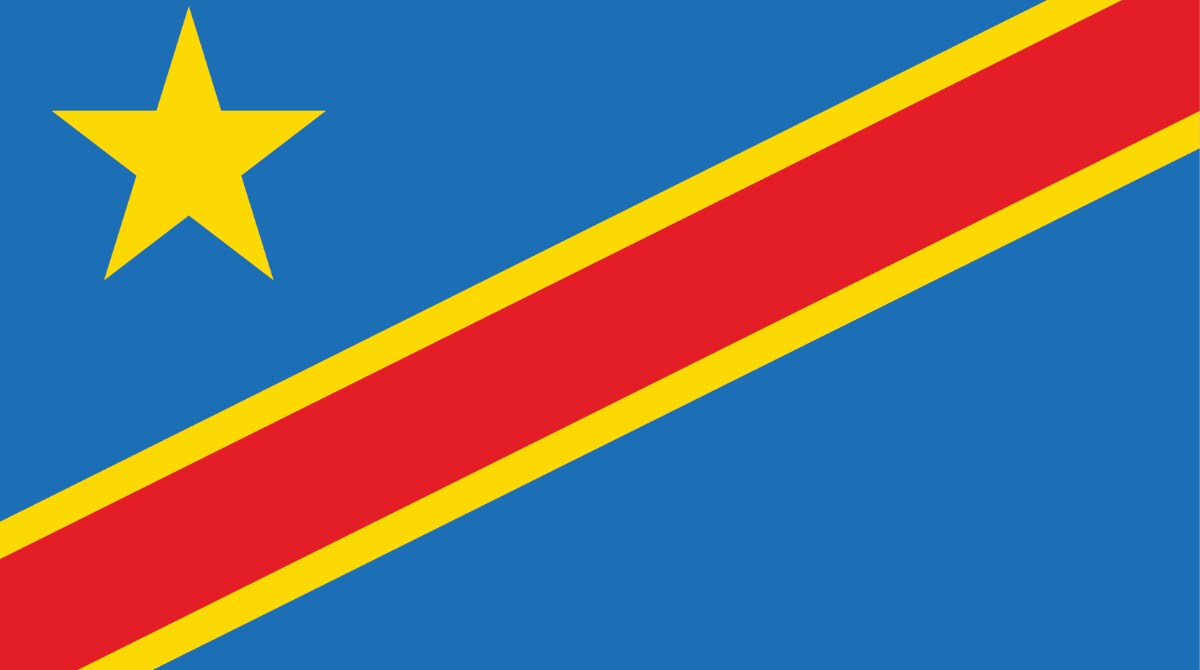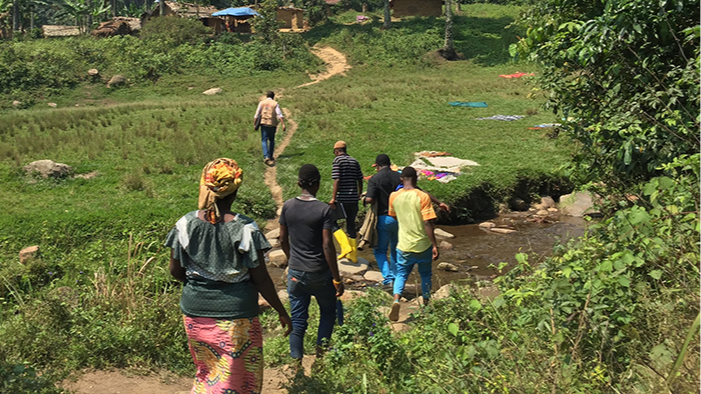At a glance
CDC established an office in the Democratic Republic of the Congo (DRC) in 2002. CDC collaborates closely with the Government of DRC, the Ministry of Health (MOH), and various partners to build effective public health collaboration and partnerships to detect, prevent, and respond to global public health threats. CDC's work aims to protect the health of Americans and support public health around the world.

Key accomplishments
- Pioneering electronic integrated disease surveillance and response (IDSR) using the DHIS2 platform in six provinces, allowing real-time surveillance reporting with integrated laboratory results, to improve the 7-1-7 model for outbreak responses in the DRC.
- Mentored 16 laboratories towards ISO 15189 accreditation, including two that became DRC’s firs internationally accredited clinical laboratories in 2025. Established diagnostic capacities for HIV, monkeypox, and viral hemorrhagic fevers (e.g., Marburg Virus Disease and Ebola), and supported installation of a lab information system in 10 laboratories to streamline operations.
- Supported the training of 925 disease detectives through the Field Epidemiology Training Program (FETP), trained 120 MOH staff in emergency management, and educated over 3,800 healthcare providers in malaria diagnosis and treatment.
- Deployed staff and lab equipment to the 2025 Ebola outbreak (16th Ebola outbreak in DRC) in Bulape to support surveillance and laboratory testing. Supported the Ebola Treatment Unit laboratory to perform specimen testing for patient follow up.
- Provided technical support for surveillance and tetanus vaccination campaigns that led to the elimination of maternal and neonatal tetanus in 2019.
- Contributed to the recent monkeypox and Ebola responses through laboratory testing, case investigations, infection prevention and control, risk communication, and community engagement.
Global health security

Photo by Mary Claire Worrell/CDC
DRC has a large population, spans a vast geographic area, and shares borders with nine other countries. CDC, MOH, and various partners collaborate to prevent, detect, respond to, and control infectious disease outbreaks within the country.
CDC was the major partner who worked with the MOH to establish the National Public Health Institute (NPHI) in 2022, which coordinates essential public health functions such as preparedness and outbreak response, surveillance, laboratory systems, and workforce development.
Laboratory strengthening
CDC has successfully accredited two laboratories to ISO 15189 standards. Additionally, CDC helped develop a national laboratory strategic plan that directs the strengthening of laboratory systems in DRC. This includes donating essential equipment and enhancing laboratory diagnostics, network optimization, and quality management systems to meet the growing demand for early diagnosis of infectious diseases.
CDC also supported the installation of a laboratory information system (LIS) in 10 laboratories to streamline their processes. Furthermore, CDC has provided training for laboratory staff and monitored testing quality through an external quality assurance program.
Workforce development
DRC’s (FETP) currently offers three levels of training: frontline, intermediate, and advanced. Participants enhance their skills in data collection and the translation of data into evidence-based actions. FETP graduates primarily include national and district public health staff, whose expertise has been vital in DRC’s responses to monkeypox, Ebola, COVID-19, and cholera.
CDC has supported more than 800 FETP deployers throughout the country to participate in polio surveillance, monkeypox and Ebola outbreak responses, vaccination campaigns, and other immunization activities. Through FETP, CDC strengthens DRC’s workforce capacity to identify and contain outbreaks before they escalate globally.
Monkeypox
CDC has provided support for monkeypox research and response in DRC for over 20 years. DRC declared a monkeypox outbreak in 2022, which was classified as a public health emergency of international concern in August 2024. As of October 2025, the country has reported approximately 100,000 monkeypox cases. CDC is actively assisting the MOH with the response including surveillance, laboratory capacity, and workforce. The deployment of 50 to 70 field epidemiologists in hotspot provinces has been instrumental in mitigating the outbreak.
CDC collaborated to assess the effectiveness of the monkeypox vaccine (MBA-BN), used in an endemic zone in 1,600 health care workers in 6 health zones of Tshuapa province. The study showed an effective antibody response in 99% of recipients for up to 5 years.
HIV and TB
As a key implementer of the U.S. President's Emergency Plan for AIDS Relief (PEPFAR), CDC plays an essential role in the fight against HIV and TB. With unmatched scientific and technical knowledge and long-standing relationships with ministries of health, CDC is uniquely positioned to advance HIV, TB, and other global health security activities that keep Americans safe at home and abroad.
Through PEPFAR, CDC provides critical support to DRC's public health infrastructure, improving the country's ability to prevent, detect, and respond to HIV, TB, and other infectious diseases and minimizing their risk from entering the U.S.
Immunization
CDC supports the MOH in the distribution and mass vaccination campaigns for new vaccines. CDC also works to improve outbreak detection, and enhance disease surveillance systems and reduce their impact on human health and economies.
CDC’s immunization-related support to DRC reduces the burden of vaccine-preventable diseases and lowers the risk of disease transmission beyond the country’s borders, thereby protecting the U.S. and safeguarding Americans.
Ebola
CDC has supported Ebola outbreak responses through disease surveillance, laboratory support, border health, data management, infection prevention and control, vaccination, and risk communication and community engagement.
For DRC’s 2025 Ebola outbreak in Bulape, CDC-supported activities included:
- Deploying a mobile sequencing laboratory to perform real-time data that links cases and guides response activities.
- Sending 27 field epidemiologists to assist with case investigations and contact-tracing. Additionally, CDC headquarters subject matter experts and CDC DRC Country Office staff have deployed to Bulape to provide technical assistance for the response.
- Digitalizing and harmonizing data by deploying and expanding the DHIS2 in Kasai and neighboring provinces to enhance real time data reporting and analysis.
Cholera
DRC continues to experience cholera outbreaks, driven by poor sanitation, limited access to clean water, and ongoing conflict. CDC provides technical assistance to MOH, focusing on improving surveillance, outbreak response, and laboratory capacities.
Additionally, CDC has funded a partner to implement essential water, sanitation, and hygiene (WASH) initiatives aimed at reducing cholera transmission by enhancing access to safe drinking water, promoting hygiene practices, and ensuring adequate sanitation facilities for vulnerable populations.
Malaria
CDC has collaborated with partners to support implementation of malaria prevention and control activities in DRC.
CDC-supported activities have included providing technical input in:
- Monitoring mosquito behavior and resistance to insecticides.
- Providing long-lasting insecticide-treated bed nets.
- Preventing malaria during pregnancy.
- Enhancing diagnostics, surveillance, and evaluation of malaria-related activities.
- Researching social and behavioral changes impacting malaria prevention and case management.
Influenza
With financial and technical support from CDC, DRC began influenza surveillance in 2006. Currently, four sentinel sites conduct influenza surveillance in DRC's capital of Kinshasa. Influenza surveillance is focused among patients with influenza-like illness or severe acute respiratory illness. These activities formed the backbone for conducting COVID-19 surveillance in DRC.

![[thumbnail] (hidden)](/global-health/media/images/2025/11/DRC_thumbnail.jpg)